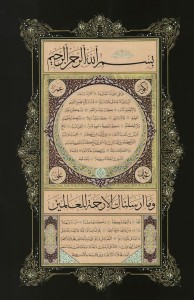 Tafsir al Tustari: [7:172] And remember when your Lord took from the Children of Adam, from their loins, their seeds, and made them testify about themselves…
Tafsir al Tustari: [7:172] And remember when your Lord took from the Children of Adam, from their loins, their seeds, and made them testify about themselves…
He [Sahl al Tustari] said: Allah, Exalted is He, took the prophets from the loins of Adam (while he was still in Heaven), and then He extracted from the back of each prophet his progeny in a molecular form [lit. in the shape of specks] possess- ing intellects (ʿuqūl). Then he took from the prophets their pledge (mīthāq), as is stated in His words, We took from the prophets their pledge: as (We did) from you and from Noah [33:7]. The Covenant that they were bound to was that they would convey from God, Exalted is He, His commandments and prohibitions. Then He called them all to affirm His lordship, with His words, Exalted is He: ‘Am I not your Lord?’ Then He manifested His omnipotence [to them], so They said: ‘Yes, we testify’ [7:172].25 Thus did God gather what He wanted (murād) from His creatures, and the beginning and end that was in store for them in their saying ‘Yes’, since this was in the manner of a trial (ibtilāʾ).26 Indeed, God, Exalted is He, said: And His Throne was upon the water, that He might try you [11:7]. He also made the prophets testify for themselves as a proof (ḥujjatan), as God, Exalted is He, has said, and made them testify concerning themselves (first).
Then He returned them to the loins of Adam, and subsequently He sent the prophets (to mankind) to remind them of His Pact and Covenant (on that day). Furthermore, within His knowledge on the day when they affirmed what they affirmed, were those who would deny it and those who would verify it,27 and the last hour will not arrive until every person who made the Covenant has appeared.
He (Imam Tustari) was asked, ‘What are the signs of happiness (saʿāda) and wretchedness (shaqāwa)?’28 He (Imam Tustari) said:
Truly, among the signs of wretchedness is the denial of His omnipotence, and truly among the signs of happiness is the expansiveness of your heart in faith,29 your being provided with riches in your heart, protection in obedience, and success in renouncing [the world] (zuhd). Whoever is inspired with propriety (adab) in that which is between him and God, Exalted is He, will be purified of heart, and bestowed with happiness. There is nothing more exacting than preserving propriety.
He was asked, ‘What is propriety?’ [He answered]:
[It is that you should] let your food be barley, your sweetmeat dates, your condiment salt, your fat yoghurt. You should let your clothes be of wool, your houses be mosques, your source of light the sun, your lamp the moon, your perfume water, your splendour cleanliness, and your adornment wariness (ḥadhr). Moreover, you should let your work consist in being content (irtiḍāʾ) — or he said contentment (riḍā) — , your journey’s provision (zād) be mindfulness of God (taqwā), your eating be at night, your sleep in the day, your speech be remembrance (dhikr), your resolve (ṣamma) and your aspiration (himma) be for contemplation (tafakkur),30 your reflective thought (naẓar) be to take example (ʿibra),31 and your refuge (maljaʾ) and the one who helps you (nāṣir) be your Lord. Persevere in this until you die.32
He also said:
Three of the signs of wretchedness (shaqāwa) are that a person misses the congregational prayer while he is close to the mosque; that he misses the congregational prayer while in Medina; and that he misses the Hajj while he is in Mecca.
[Returning to the interpretation of the verse 7:172], Imam Sahl al Tustari said:
There is no one who is not overcome by Iblīs, may God curse him, or captured by him, save the prophets, and the veracious (ṣiddīqūn), whose hearts bear witness to their faith according to their [different] stations (maqāmāt), and who know that God observes them in all their states. Furthermore, according to the measure of their witnessing (mushāhada), they experience trial[s] (ibtilāʾ), and according to the measure of their experience of trials, they seek protection. Likewise according to the measure of their poverty (faqr) and need (fāqa) for Him,34 they recognise harm (ḍurr) and benefit (naf ʿ), and increase in knowledge (ʿilm), understanding (fahm) and reflective thought (naẓar).
Then he said:
God has not placed a burden of service (khidma) upon any of the prophets as great as that which he placed upon our Prophet. Furthermore, there is not a position of service in which God, Exalted is He, has been served by the children of Adam up to the time when He sent our Prophet, in which our Prophet has not served God.
[/fusion_builder_column][/fusion_builder_row][/fusion_builder_container]
